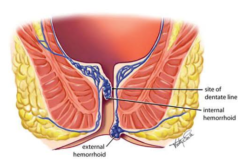
Internal hemorrhoids are swollen veins located inside the rectum. They are a common condition that can cause discomfort and pain. Understanding the symptoms and available treatments for internal hemorrhoids can help manage and alleviate the condition effectively.
Symptoms of Internal Hemorrhoids
Internal hemorrhoids typically do not cause pain because they are located inside the rectum, where there are fewer pain receptors. However, they can cause a range of symptoms that might lead individuals to seek treatment. Common symptoms include:
- Rectal Bleeding: One of the most noticeable symptoms is the presence of bright red blood on toilet paper or in the toilet bowl after a bowel movement. The blood is usually not mixed with stool but may appear on the surface.
- Prolapse: Internal hemorrhoids can protrude through the anus during bowel movements or when straining. This is known as prolapse and can cause discomfort or a feeling of fullness in the rectum.
- Itching and Irritation: Although internal hemorrhoids themselves are not directly painful, they can cause itching and irritation around the anus due to mucus discharge and inflammation.
- Mucus Discharge: Some individuals may experience mucus discharge from the rectum, which can contribute to irritation and discomfort.
Treatment for Internal Hemorrhoids
Treatment for internal hemorrhoids varies depending on the severity of the condition. Mild cases may be managed with home remedies and lifestyle changes, while more severe cases might require medical intervention.
Home Remedies and Lifestyle Changes
- Increase Fiber Intake: A diet high in fiber can help soften stools and reduce the strain during bowel movements. Include fruits, vegetables, whole grains, and legumes in your diet to promote regular bowel movements.
- Stay Hydrated: Drinking plenty of fluids helps prevent constipation and eases bowel movements. Aim for at least eight glasses of water a day.
- Use Over-the-counter Treatments: Topical treatments, such as creams, ointments, or suppositories, can provide temporary relief from itching and discomfort. Look for products containing hydrocortisone or witch hazel.
- Warm Sitz Baths: Soaking the affected area in a warm sitz bath for about 10 to 15 minutes several times a day can help reduce swelling and provide relief from discomfort.
- Avoid Straining: Try to avoid straining during bowel movements, which can worsen internal hemorrhoids. Establish a regular bowel routine and use stool softeners if necessary.
Medical Treatments
For persistent or severe cases of internal hemorrhoids, medical treatments may be required:
- Rubber Band Ligation: This procedure involves placing a rubber band around the base of the hemorrhoid, cutting off its blood supply. The hemorrhoid eventually shrinks and falls off. This is a common and effective treatment for internal hemorrhoids.
- Sclerotherapy: Sclerotherapy involves injecting a chemical solution into the hemorrhoid to shrink it. The solution causes the blood vessel to harden and shrink, reducing the size of the hemorrhoid.
- Infrared Coagulation (IRC): IRC uses infrared light to coagulate the blood vessels in the hemorrhoid, causing it to shrink and eventually fall off.
- Hemorrhoidectomy: In cases where other treatments are ineffective, a hemorrhoidectomy may be necessary. This surgical procedure involves removing the hemorrhoids and is typically recommended for severe cases.
Prevention of Internal Hemorrhoids
Maintaining a healthy lifestyle is crucial for the prevention of internal hemorrhoids. Regular exercise can promote efficient bowel function and reduce the risk of constipation, which is a major contributing factor to the development of hemorrhoids. It's also important to heed the body's natural urges and not delay bowel movements, as holding stool can lead to harder, more difficult-to-pass bowel movements that increase the strain on rectal veins. Additionally, avoiding prolonged sitting can help reduce pressure on the rectal area. Adopting these habits can significantly lower the likelihood of developing internal hemorrhoids and improve overall digestive health.
Conclusion
Internal hemorrhoids can cause discomfort and a range of symptoms, but various treatments are available to manage and alleviate the condition. Mild cases can often be managed with lifestyle changes and home remedies, while more severe cases may require medical intervention. If you experience persistent or severe symptoms, consult a healthcare provider for a thorough evaluation and appropriate treatment options. Addressing internal hemorrhoids promptly can help improve quality of life and prevent complications.
